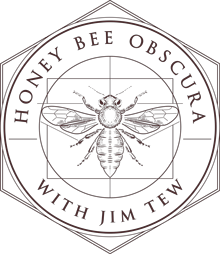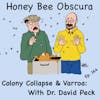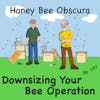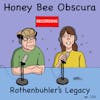Colony Collapse and Varroa, Plain Talk with Dr. David Peck (164)

In today's episode, Jim is joined by Dr. David Peck, an expert in varroa mites, to delve into the critical issue of honey bee colony collapse linked to varroa infestation. This topic is different from Colony Collapse Disorder (CCD), focusing instead...
In today's episode, Jim is joined by Dr. David Peck, an expert in varroa mites, to delve into the critical issue of honey bee colony collapse linked to varroa infestation. This topic is different from Colony Collapse Disorder (CCD), focusing instead on the impact of varroa mites and the diseases they introduce to both adult bees and larvae.
The episode addresses a common frustration among beekeepers: the collapse of their strongest and most productive summer colonies. These hives, characterized by their daily activity, young queens, and abundant honey production, fall victim to the escalating varroa mite population. As the bee population increases over the summer, so does the number of varroa mites. This problem intensifies late summer and into fall, as the queen reduces her activity and 'winter bees' emerge in smaller and weaker numbers due to the overwhelming presence of varroa and the diseases they carry. By winter, these colonies are often too weakened to survive even the first cold spell, despite having ample honey reserves.
Complicating matters, these varroa-weakened colonies become targets for robbing, which facilitates the spread of varroa mites to other hives. This episode sheds light on the dual challenge modern beekeepers face: managing both the honey bee and the varroa mite. Tune in as Jim and Dave explore this complex and pressing issue in beekeeping.
Websites and links mentioned in the episode:
- Betterbee's "Collapse of a High Mite Hive" video: https://www.youtube.com/watch?v=RgZzIJgR69g
- Cervo et al. (2014) demonstrate that high mite populations change varroa mites' preference for bees of different ages, in a what that could facilitate mite spread through robbing and/or drift: https://www.researchgate.net/profile/Federico-Cappa/publication/265133875_High_Varroa_mite_abundance_influences_chemical_profiles_of_worker_bees_and_mite-host_preferences/links/5416b1080cf2bb7347db6904/High-Varroa-mite-abundance-influences-chemical-profiles-of-worker-bees-and-mite-host-preferences.pdf
______________________
Thanks to Betterbee for sponsoring today's episode. Betterbee’s mission is to support every beekeeper with excellent customer service, continued education and quality equipment. From their colorful and informative catalog to their support of beekeeper educational activities, including this podcast series, Betterbee truly is Beekeepers Serving Beekeepers. See for yourself at www.betterbee.com
______________________
Honey Bee Obscura is brought to you by Growing Planet Media, LLC, the home of Beekeeping Today Podcast.
Music: Heart & Soul by Gyom, All We Know by Midway Music; Christmas Avenue by Immersive Music; original guitar music by Jeffrey Ott
Cartoons by: John Martin (Beezwax Comics)
Copyright © 2024 by Growing Planet Media, LLC

Episode 164 – Colony Collapse and Varroa, Plain Talk with Dr. David Peck
[music]
Jim Tew: Honey Bee Obscura listeners, it's a rainy, overcast, gloomy day, so I thought, "What a great day to discuss the whole concept of a colony collapsing because of varroa mite predation." I've been through that a lot more than I want to have been through it. It's not a happy situation, and I think that we would all be better suited for having an idea of how to deal with it and what it looks like. David's here with me. He knows all about it. He's apparently quite the professional at collapsing colonies. Is that right, David?
David Peck: [laughs] Yes, that's a fair way to say it. When people would ask me in grad school what I did, I'd say, "Well, I'm not really a beekeeper, I'm a varroa mite keeper," and the best way to keep varroa mites is to just keep your bees really poorly. I have deliberately caused a whole lot of colonies to collapse right before my very eyes so that I could study the process.
I think that makes me particularly able to help other people navigate through it, whether something's going wrong in their colony or if they want to prevent it from happening. I've got a lot of experience about what happens when you go too far down that road.
Jim: Well, I want to hear about it. Let me say first who we are and who you are, and then let's talk to our listeners. I'm Jim Tew. I'm here at Honey Bee Obscura, where once a week we do something, talking about some aspect of honeybees.
David: I'm David Peck from Betterbee. I'm the Director of Research and Education, and whenever Jim asks me to come on the podcast, I always agree because it's always a fun conversation.
Jim: I always learn more than I can ever contribute. David, I appreciate you being here.
Introduction: Welcome to Honey Bee Obscura, brought to you by Growing Planet Media, the producers of the Beekeeping Today Podcast. Join Jim Tew, your guide through the complexities, the beauty, the fun and the challenges of managing honeybees. Jim hosts fun and interesting guests who take a deep dive into the intricate world of honeybees. Whether you're a seasoned beekeeper or just getting started, get ready for some plain talk that'll delve into all things honeybees.
Jim: David, did you select this topic for your PhD work, or was it a sign? Was there a funding for it? Why would a person decide to get in the business of exploring a gloomy aspect of beekeeping?
David: It was all me. I'm responsible for disappointing and depressing my PhD advisor, Tom Seeley, for a few years there because he loves honeybees because they're cooperative, and they're so sophisticated, and they do such amazing, wonderful things, and they make delicious honey. I came into the lab as a parasitologist. I think it's really cool when animals cheat and exploit each other and attack each other.
I came in right from the get-go to study varroa mites. The bees were just incidental. That's just where the varroa mites lived. Then I fell in love with the honeybees as a part of that work. Right from the get-go, when I showed up, I said, "Tom, I want to come in. I want to study bee parasites." He said, "That's good because they sure need studying." I knew as I designed my experiments that some of the things that I would study, like how varroa mite spread from a colony as it collapses, were going to require me to cause that colony to collapse.
I had one apiary at one summer in particular where their full-time job was just manufacturing more varroa mites than they could handle so that then I could take colonies and move them out and set them up for experiments where they were doomed to fail.
Jim: You touch an interesting subject unintentionally. For those of us who keep bees, love bees, think about bees, work with bees, you can't do any of that if you don't buy this varroa thing first. In essence, you got to keep varroa first before you can keep your bees.
David: Well, the nice thing about varroa is that they keep themselves. If the bees are alive, the varroa are there, so you have to manage and intervene. You're right, the great thing about learning beekeeping while I was studying varroa was I made all the classic beekeeper mistakes, but all it did was it increased my varroa population, which was what I wanted in the first place. I didn't have to be a good beekeeper to study the mites. I had to be a bad beekeeper, and that's an awful lot easier.
Jim: Before we go any further, you and I talked about this before we started here just a bit ago, that we keep referring to these colonies collapsing. I'd like for you to discuss colony collapse disorder compared to colonies collapsing from excessive varroa predation.
David: We use this term collapse, and it can sometimes get us in trouble because a lot of people are familiar with CCD or colony collapse disorder as a very specific phenomenon. It was this observation that suddenly, a couple of 10-plus years ago, all the colonies were dying, all the bees were vanishing. They went out. We wanted to study what was causing colony collapse disorder.
First, they described exactly what they were talking about, these very specific symptoms of a colony, basically just losing the thread and suddenly most of the bee population vanishing. Then we tried to figure out what had caused it. A great deal of research has gone to show us that a significant contributor is high levels of varroa, although there are other things that can also lead to those symptoms.
That's not quite what we're talking about today. When we're talking about a colony that collapses because of varroa, we're really just talking about what a statistician might call a demographic collapse. There's this problem where the number of bees that are born and grow up and mature every week are much lower than the number of bees that are dying from one cause or the other.
What we observe when varroa causes a colony's population to collapse is that suddenly we don't have as many adult bees. We've got a lot of brood that are typically left uncared for and untended. There's this whole suite of symptoms that you can observe in a colony that is going through this varroa and virus-caused population crash.
Jim: The way that affected me as you tell the story, I do want to say it was several years ago in my defense, colony looked great, Dr. Peck. It was a powerful colony that was thriving. It was booming. If it's working, don't fix it kind of mentality is what I had. As time rocked on, you begin to notice that not quite as much flight activity as there was there for a while.
Then as you wait another week or so, you begin to see more twisted wing bees out in the grass in front there, and you see some symptoms. You begin to get that thing that you get before you have an idea, "Something's not right here." Then when you open it up, it's just chaos inside. My first thought was that I had American foulbrood, and I assumed what I was looking at was parasitic mite syndrome. I had this big panic, and I thought, "Oh, my stars, now I wish I had varroa."
I've got all this infectious American foulbrood to deal with, and my apiary is contaminated. That was my first exposure to having a colony collapse. I thought that if this is a booming buster beehive, leave it alone. By leaving it alone, they went crazy.
David: I am so, so glad that you said that because that is maybe the most important lesson I can teach a beekeeper, is that when I said that I set up that apiary to breed those mites to cause those colonies to die, people think, "Oh, it must've been so dreary. You'd go out. How could you even keep the bees alive?" For most of the summer, those were some of my most productive colonies. They were doing great.
I was just giving them lots of space for brood. I was feeding them. They were growing and growing and growing. They were booming colonies. They were healthy colonies. They had young queens that I'd started them off with. Everything was great. The only problem was that mite population was getting higher and higher and higher and higher. I think that people often fall into the trap that you described, which is that you look out at the colony, and you think, "I haven't had time to test my mites, but if they were really sick, surely they would look sick, so I probably don't have to do any intervention." That is a major mistake.
One of the things that we did after I took this job at Betterbee is I started describing this story to some of the folks here, and they said, "Gosh, wouldn't that be great to teach other people about?" What we did was we took a hive, and we set it up at my own personal home apiary because they didn't want to do it in any of the company's bee yards. We set it up out there, and we did exactly what I'd done during my research. I just bred varroa mites and didn't treat them.
That colony was doing great. They were really strong. They were really healthy. They made a nice honey crop. We went out, and we recorded them in, I think it was August. Then clear as day, you go out to the apiary, you can see this is a strong colony, this is a healthy colony. There's a lot of flight. We took a mite wash, and it was way too high. Then we didn't do anything. We didn't intervene.
We went back there a few weeks, a month later, and we saw that there were hardly any bees. The brood were all chilled and dying and half decomposed, and the colony had completely collapsed. It was caused by the mites, but there was no prelude of a long, slow, graceful decline. It was a booming colony, and then it was a colony that was done, not a colony that slowly frittered itself away.
Jim: You're describing my situation. I sound lazy, Dr. Peck. I sound lazy for not wanting to open it. This is a big colony. It's three supers, too deep. This is going to be a lot of work. It's really functioning nicely. You knew in your heart you got varroa. The whole world has varroa essentially. If you're not treating, you're not doing something. In my case, I just wanted to believe that somehow this was a special colony that had figured out a way to work around it, and it really had not.
Everything you're saying I completely agree with. It seemed to happen abruptly. I wonder if you know what that tilt point is when all of a sudden-- It looks like it's all of a sudden, maybe it's not all of a sudden. Maybe it was happening all along, but it reached a tipping point where this colony no longer is going to function as a hive.
David: It's a little bit of both. I think that there's definitely a perception that we humans have that everything's great, great, great, great, great, terrible, and that they just fall off a cliff. I don't think that's quite the case. We know that honeybees are very adaptable. If half of the workforce of a colony dies, half of the foragers die, you're going to have some young bees that should have been poking around inside who suddenly become foragers and go out and start flying. I think that you'll see the same traffic at the entrance even if you've got older bees starting to keel over and die at too fast a rate. The colony will appear to be okay until it isn't.
I think that's true of a lot of things. Things are fine until they aren't. We've got a lot of examples of systems that are able to keep themselves stable as long as they've got that ability, and when they lose the ability, things just fall to pieces instantly. I think we see that in our colonies as well, that the bees are wallpapering over some of their health issues until they just can't do it anymore. Other than that, there's been a lot of research done on this phenomenon. How it is that a colony can appear to be healthy and then suddenly be in dire straits. I don't think that we know really confidently exactly what it is.
Is it the deformed wing virus getting into the brains of these bees that make them less efficient? Is it them getting lost and drifting off and not coming home, or is it that their lifespan is reduced? They go out, and they die, or they die underneath in the bottom of the hive, and they get hauled out and tossed into the grass? We're just not sure exactly how it is that when that tipping point arrives, the colony so quickly appears to decline.
Jim: You had a great quote there a bit ago. Things are fine until they're not. That describes life, all aspects of life. Let's take a short break and hear from our sponsor, and when we come back, let's discuss exactly what you think a Varroa bomb is.
Betterbee: Winter's chill won't last forever. It's time to think of spring. On warm days, take a break from hibernation and check to see if your bees are out and about. Knock on wood, or better yet, a hive. No buzz? Can't hear the hum? Oh-oh, time to think ahead. You might need to replenish your colony. Fear not. Head to betterbee.com/bees and secure your package or a new colony now. Don't be left out in the cold. Plan ahead, because at Betterbee, we're making sure your spring bees are all a buzz.
Jim: All right. We've got this mess. This colony has completely collapsed, Varroa has taken over the colony, and we've got a real mess. What does that mean for the other bees in my apiary? What does that mean for cleaning up that equipment? What does that mean for the future of my bee operation in this yard?
David: The consequences for the equipment left behind by a colony that has collapsed are pretty straightforward. Varroa is not going to live on your equipment for six months until you get your new package or your new swarm and move them in. You don't really have to worry about the mites lingering inside the frames or the combs or the boxes. The problem is, those mites aren't all just going to gracefully accept their demise. They are going to take any opportunity that they've got to get into other colonies nearby.
We know that when a colony gets very high mite levels, and especially when they get high mite levels, and then they start to die, we know that the mite populations in colonies nearby also increase. That's something that has been observed over and over, and you can observe it in your own apiary if you just stop treating and managing your mites properly. One of the projects that I did during my doctoral work was trying to study exactly how it is that mites get from hive A to hive B. How is it that these Varroa mites are getting into the previously healthy hives nearby?
We said, "Look, there's no way that a Varroa mite's crawling down through the grass past all the ants and the spiders and then up the hive stand into the next hive over. The only way that a mite gets into a new colony is riding on a bee. The two circumstances where that can happen is if one of those bees from that infested hive leaves with a Varroa mite on her body and then on her way back home decides that she's going to go visit the neighbors instead of going into her own hive. That's a behavior that we call drift. It's a worker that either because she got confused or for whatever other reason.
I say worker, it could also be a drone. They're going to fly out, and instead of returning to the home hive, they're going to go into the neighbor's house. If they're carrying a Varroa mite, even if that bee arrives and gets hassled by the guards, and the guards sting her, and then she gets dragged out to the entrance, if that mite is swift and agile enough, she can jump onto one of the guards and ride them right back inside that evening and then set to reproducing. We know that drift is one way they can spread. We also know that another way you can spread mites between colonies is through robbing.
If one of the colonies in the apiary goes in and starts robbing the sick one, and of course, the weaker they get, the closer they get to collapse, the more easy they are to get robbed by other bees. That colony is going to have a perfect opportunity for mites to jump onto the robbers and then ride them home to the big strong healthy colony that sent them out as the raiding party. One of the projects that we tried to do was to study exactly those behaviors. Drifting and robbing between colonies to try to figure out, "Well, which of these two things is really spreading the mites?" What we did, we published a paper.
The title of it is something like mite bombs or robber lures. We did that because what we realized is this idea of a mite bomb, a sick colony full of mites that's just going to blast them out into the whole apiary, didn't really ring true to what we observed. We saw that as the colonies with high mites, the mite levels got higher and higher and higher, they did lead to some drifting of bees into the nearby colonies, and those colonies did have slight increases in their mite populations. The really dramatic spikes in the mite population happened when robbing took place.
We observed that robbing firsthand, and we watched as huge numbers of robbers came and went, and therefore, huge numbers of mites wound up in the neighboring colonies. I will say, at the same time, the reason that we suggested that idea of talking about robber lures, is that that might be a better description of what's really going on. It's less that a colony blew up and blasted all of their bees and mites out into the apiary. It's more that this colony got sick, and then the mites booby-trapped it for the robbers that were going to get tempted to come inside and pick up some honey.
At the same time I was doing that project, Randy Oliver in California was doing his own study of these same things. Randy has written a number of articles on his drift and robbing and mite spread research. What's interesting is that Randy found basically the opposite of what we did. We said in the fall, in upstate New York where we did this study, drift was negligible, robbing was really significant. What Randy found in California where he studied is drift was primarily, he thought, responsible for spreading the mites, and robbing may have been happening a little bit between a couple of the apiaries.
What we concluded was, this is a complex phenomenon. It's not straightforward. People say, "Oh, are you mad at Randy because he disproved your hypothesis?" I said, "No, neither of us disproved anything." We just both did an experiment. We both collected data and reported it. What we've learned is bees in different places, in different climates, under different circumstances, are going to spread mites probably in different ways.
Jim: What results then is seemingly these intelligent mites realize that their host was dead and dying, and they made this apparent conscious decision to abandon ship. In reality, isn't it more of a mite, "Here's a bee, I'm a mite, I need a ride, I'll take a ride." It's not that this colony is dying, it's just that I need a bee right here, right now, and I'm making no decision other than that decision to grab onto that bee.
David: Part of it is definitely that. It's a lot easier if half the bees or three quarters of the adult bees in the hive have recently died, this collapse that we're talking about. Obviously, a mite wandering around looking for someone to jump onto is more likely to find a robber, because the robber is now boosting the adult bee population. However, there is some really interesting research that's been done, and maybe we can link it in the podcast description, but there's been some good work that has shown, that as a colony's mite level gets higher and higher and higher, those mites that prefer to ride around on just the young nurse bees, they relax that preference.
They can smell the difference between a young bee and an old one, and they become more interested in, or at least more willing to, ride around on an older bee. A bee like a robber coming in or a bee like a forager that might fly out and then if the mite is lucky, drift into another susceptible hive. There's some sophistication going on, but we don't want to overestimate the intelligence or sophistication of these tiny little mites with their teeny little brains. At the same time, one of the pieces of advice that I always give people is never underestimate a parasite.
They're gross. We don't like them. They spread disease. They do all sorts of nasty stuff to our bees or to us, and so we don't like them. We have a natural human bias to underestimate them, to think that they're ignorant and miserable and slimy and wretched. If you look at the behavior of a mite or of a tick or of the tapeworm, what you'll find is that they are extremely good at the things that they have to be good at in order to survive. Varroa have to be good at managing healthy colonies and sick colonies and at spreading and getting to move into that next generation.
What I found as a mite scientist over and over again is, if I underestimate them, I wind up feeling foolish. It's hard to overestimate them because they wind up being pretty darn sophisticated if you look closely and give them a chance to show off what they're up to.
Jim: They're an admirable foe. They've taken the best the world has to offer against them, and they're bloodied, but they're still standing.
David: Absolutely.
Jim: Give us some closing points on what you see happening now. Clean the apiary up, get a fresh package, wait a few weeks, the mites die off and start over again next season.
David: If you have a colony that collapses due to high mites, you have to assume that some of those mites made it out and that they've spread. They might spread into your apiary. They might spread into your neighbor's apiary. They might spread into the feral colony living-- You lost a swarm two years ago, and they moved into the tree, and they're still up there. Any bees in your landscape can harbor Varroa.
If you've had an event where there were a whole lot of mites, and some of them might have spread, you need to be more sensitive to Varroa in your landscape, in your neighborhood. If you've been keeping all of your mite populations really low for the last couple of years, and you don't have any beekeeping neighbors, or you're working with your neighbors, and they're keeping their mites low too, well, it's entirely possible that your mite pressure, that invasion pressure into your apiary is going to be a little lower, and you might be able to eliminate one of the treatments you're doing each year as long as you stay on top of the other two or three or four or whatever you're doing.
I think it's just a matter of keeping yourself aware of how many mites you've got in each of your hives and remembering that their job is to reproduce and multiply and spread. They're going to keep doing that. You better make sure that you're staying on top of it.
Jim: Don't you have a video that you've made?
David: As I mentioned, we did that experiment here at Betterbee in that project where we showed off how quickly a colony can go from booming and healthy to really, really limping along and then dead. I'll make sure that we link to that, too. It's a video called The Collapse of a High Might Hive. We did that just to show people what it looks like.
What I've found, it saves me an awful lot of time every year because people call us up, and they say, "I don't know what happened. My bees suddenly died. I just can't explain it. They were doing great." I say, "Why don't you watch this five-minute video, and at the end of it, I'm happy to talk to you if you don't think that Varroa caused your problem." Most of the people who watch it go, "You know what, that's exactly what I saw. It must have been the mites."
Jim: Yes. [laughs]
David: Then I know that I'm talking to them about Varroa and not something scarier like American foulbrood or pesticide kill or something like that. Varroa are a pernicious foe, but they're manageable. We've got tools to fight them. It's a lot easier to keep your Varroa mites low in your hive than it is to convince the farmer next door to stop spraying a pesticide that might be hurting your bees. Of all of the challenges we've got before us, it's the one that's in some ways the most manageable. It just requires an awful lot of management from us.
Jim: Dr. David Peck, it's always a pleasure to talk with you. I'm always a better person for listening and discussing these things with you. I wish we could end on a bright note, but if you don't treat and control Varroa, they're going to treat and control your bees.
David: The only bright note I can offer is if you do treat, and you do control varroa, then you can get back to the fun of beekeeping, and you don't have to spend quite as much time worrying about the downsides of a parasite infestation .
Jim: All right. Thank talking to me, sir. I look forward to chatting with you again soon.
David: Thank you for having me. It's always a pleasure.
[music]
[00:23:32] [END OF AUDIO]
New to Honey Bee Obscura Podcast?
Here are some great episodes to start with. Or, check out episodes by topic.







 In today's episode, Jim is joined by Dr. David Peck, an expert in varroa mites, to delve into the critical issue of honey bee colony collapse linked to varroa infestation. This topic is different from Colony Collapse Disorder (CCD), focusing instead on the impact of varroa mites and the diseases they introduce to both adult bees and larvae.
In today's episode, Jim is joined by Dr. David Peck, an expert in varroa mites, to delve into the critical issue of honey bee colony collapse linked to varroa infestation. This topic is different from Colony Collapse Disorder (CCD), focusing instead on the impact of varroa mites and the diseases they introduce to both adult bees and larvae.






